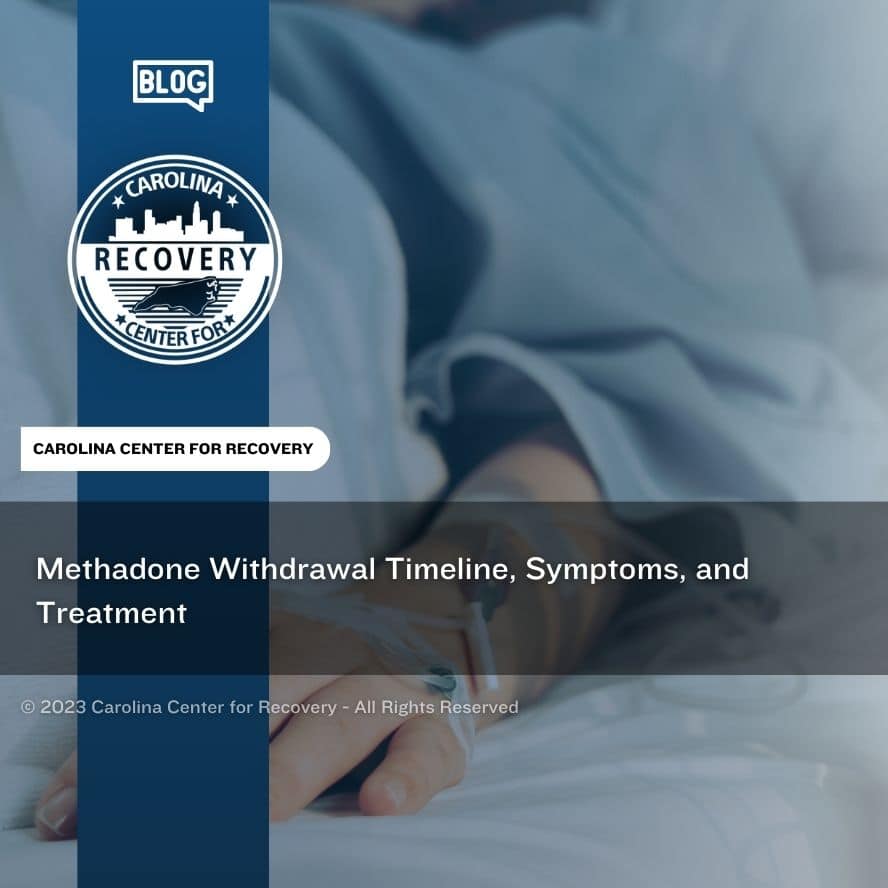Methadone Withdrawal Timeline, Symptoms, and Treatment

Medically Verified: 2/1/24
Medical Reviewer
Chief Editor

All of the information on this page has been reviewed and verified by a certified addiction professional.
Methadone is a medication that is often used to treat opioid use disorder.[1] While this medication can be incredibly helpful in managing opioid withdrawal symptoms and cravings, it can be abused. Methadone is considered a full opioid agonist, which means it targets opioid receptors in the brain and can create a high when taken in excess.
If you or a loved one abuse methadone, it is important to know that you can become dependent on it. When you are dependent on methadone, suddenly stopping its use will result in withdrawal symptoms. But what are the withdrawal symptoms associated with methadone and how long do they last?
Methadone withdrawal may cause nausea and vomiting, muscle aches, agitation, sweating, and more. The symptoms will arise within 30 hours of your last dose and last for up to 10 days. Methadone withdrawal should always be treated under the supervision of a medical detox center.
What are the Symptoms of Methadone Withdrawal?
While methadone can relieve the symptoms of opioid withdrawal, abusing it could lead to addiction. When you are addicted to methadone, your body relies on it to function properly. As a result, suddenly stopping the use of methadone can result in withdrawal symptoms.
The symptoms of methadone withdrawal may include:[2]
- Agitation or anxiety
- Restlessness or insomnia
- Feelings of depression
- Increased yawning
- Excessive sweating
- Tearing or watery eyes
- Runny nose
- Shivering or goosebumps
- Nausea and vomiting
- Diarrhea
- Muscle aches and joint pain
- Abdominal cramps
Even though methadone withdrawal is usually not life-threatening, you should never attempt to overcome it on your own. Doing so could lead to a relapse, which could cause an overdose if you try to use the same dose as when you had a tolerance to methadone. Instead, seek help from a professional medical detox center that can provide you with treatment to soothe your withdrawal symptoms and prevent cravings.
The Methadone Withdrawal Timeline
Since methadone is a long-acting opioid, it might take longer for withdrawal symptoms to arise. Typically, withdrawal symptoms begin 30 hours after your last dose and continue to affect you for about 10 days.
The methadone withdrawal timeline can vary from person to person. The longer you’ve been addicted to methadone and the higher your tolerance is, the more severe and long-lasting your withdrawal symptoms will be. Other factors such as metabolism, frequency of use, and genetics can also influence the withdrawal timeline.
30 Hours
Sometime around 30 hours after your last dose of methadone, you will begin experiencing withdrawal symptoms. While initial symptoms of methadone withdrawal are usually mild, you should always be receiving care from a medical detox program.
Early symptoms of withdrawal may include irritability, feelings of depression, nausea, and slight abdominal cramps.
3 Days
At around the 3rd day of methadone withdrawal, your symptoms will begin to peak. This means they will be at their most severe.
Peak symptoms may include:
- Nausea and vomiting
- Diarrhea
- Insomnia and restlessness
- Anxiety and agitation
- Muscle and bone pain
- Excessive sweating
- Dilated pupils
- Shivering
- Abdominal cramps
If you are receiving treatment from a medical detox center, you will be given medications to limit your symptoms and ensure that you remain comfortable during the recovery process.
4 to 10 Days
After your symptoms peak, they will begin to subside. Typically, symptoms begin to decrease in severity after the 4th day and will completely end around the 10th day. However, some people may continue to experience psychological symptoms of withdrawal like insomnia, anxiety, and depression for a couple of weeks to a few months if they develop a condition known as post-acute withdrawal syndrome (PAWS).[3]
How is Methadone Withdrawal Treated?
Methadone withdrawal is best treated under the supervision of a medical detox center. Since methadone is a medication used to treat opioid withdrawal, it is unlikely that you will be given another opioid medication. Instead, most detox centers gradually taper you off of methadone until your symptoms subside.
Using the tapering method prevents you from experiencing severe withdrawal symptoms or cravings, keeping you motivated and focused on your recovery. In addition to tapering you off of methadone, nurses and doctors will monitor your health throughout the detoxification process to ensure you are stable.
Once you are off of methadone completely, you will begin planning the next phases of your treatment with a therapist. Typically, this involves deciding whether you will transition into inpatient or outpatient rehab. Both types of addiction treatment programs use behavioral therapy, group counseling, and aftercare planning to help you build a strong foundation of recovery to rely on.
Find Help for Methadone Withdrawal
If you or a loved one suffer from methadone addiction, the first step toward recovery is detox. At Carolina Center for Recovery, our comprehensive, compassionate, and unique treatment helps build a foundation for a healthy recovery and sober future. Clients at Carolina Center for Recovery undergo a personalized journey through one of our highly effective treatment programs.
To learn more about methadone withdrawal treatment, contact the Carolina Center for Recovery today.
References:
- The Substance Abuse and Mental Health Services Administration (SAMHSA): What is Methadone, Retrieved November 2023 From https://www.samhsa.gov/medications-substance-use-disorders/medications-counseling-related-conditions/methadone
- The National Library of Medicine (NLM): Opioid Withdrawal, Retrieved November 2023 From https://www.ncbi.nlm.nih.gov/books/NBK526012/
- The National Library of Medicine (NLM): Post-Acute Withdrawal Syndrome, Retrieved November 2023 From https://pubmed.ncbi.nlm.nih.gov/36731102/

